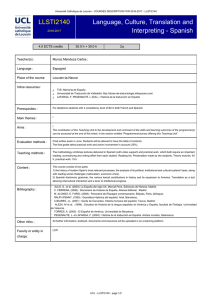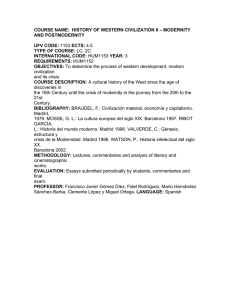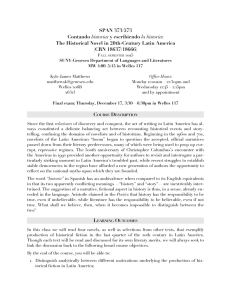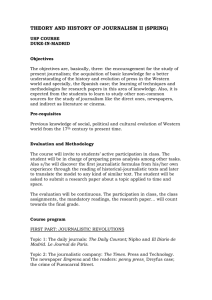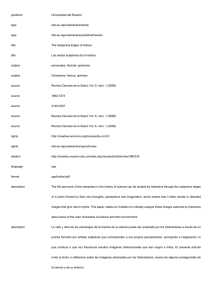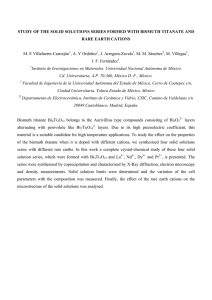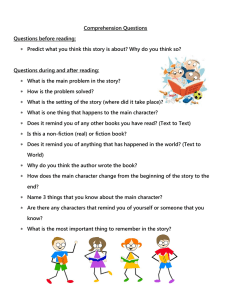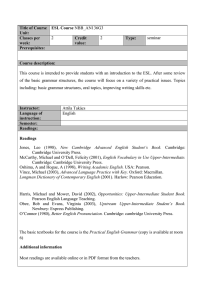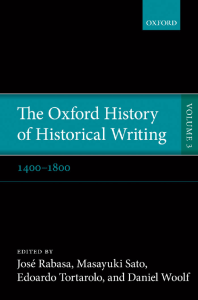Environmental History and Environmentalist Thought, San Diego
Anuncio
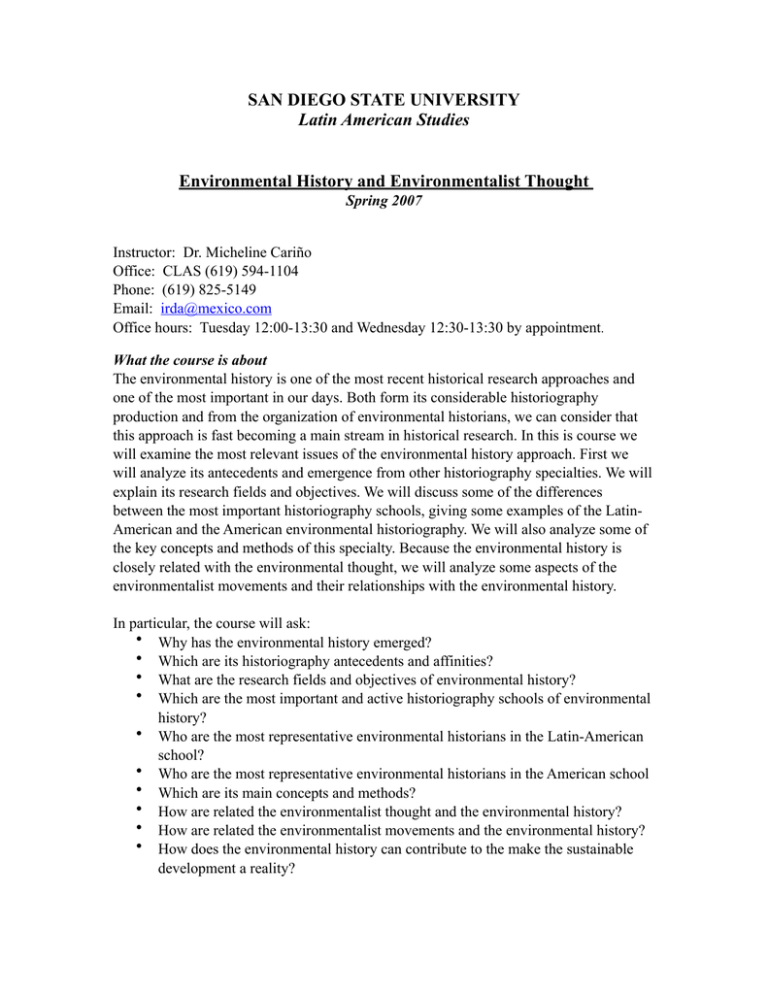
SAN DIEGO STATE UNIVERSITY Latin American Studies Environmental History and Environmentalist Thought Spring 2007 Instructor: Dr. Micheline Cariño Office: CLAS (619) 594-1104 Phone: (619) 825-5149 Email: [email protected] Office hours: Tuesday 12:00-13:30 and Wednesday 12:30-13:30 by appointment. What the course is about The environmental history is one of the most recent historical research approaches and one of the most important in our days. Both form its considerable historiography production and from the organization of environmental historians, we can consider that this approach is fast becoming a main stream in historical research. In this is course we will examine the most relevant issues of the environmental history approach. First we will analyze its antecedents and emergence from other historiography specialties. We will explain its research fields and objectives. We will discuss some of the differences between the most important historiography schools, giving some examples of the LatinAmerican and the American environmental historiography. We will also analyze some of the key concepts and methods of this specialty. Because the environmental history is closely related with the environmental thought, we will analyze some aspects of the environmentalist movements and their relationships with the environmental history. In particular, the course will ask: • Why has the environmental history emerged? • Which are its historiography antecedents and affinities? • What are the research fields and objectives of environmental history? • Which are the most important and active historiography schools of environmental history? • Who are the most representative environmental historians in the Latin-American school? • Who are the most representative environmental historians in the American school • Which are its main concepts and methods? • How are related the environmentalist thought and the environmental history? • How are related the environmentalist movements and the environmental history? • How does the environmental history can contribute to the make the sustainable development a reality? • How the environmental history can contribute to reinforce the conservation of natural resources? Prerequisites Reading in Spanish is not necessary but it is highly recommended. Course Objectives After taking this course, you will be able to: • Broadly discuss the most important issues that concern the environmental history; • Explain the emergence of this specialty and the reasons why it is becoming a main stream; • Examine the environmental history historiography schools; • Examine the environmental history historiography; • Analyze the key concepts and methods of environmental history research; • Identify the more relevant methodological strategies to undertake a research project with the environmental history approach; • Analyze the relationships between the environmental thought and the environmental history; • Explain how the environmental history can contribute to reinforce the environmental movement, the sustainable development and the conservation of natural resources. Important information Late assignments are accepted but penalized. Please do not miss class. Grades: Graduate students Attendance and participation: 10% Two short papers (5-6 pages each): 15%. One oral presentation on any subject of the course: 15%. One final essay on any subject of the course, but different on the one chosen for the oral presentation (15 to 25 pages): 45%. The short papers are designed to check your reading and/or to engage you with the material beyond the reading. The oral exposition and the final essay must allow you to know deeply two issues that interest you the most on Environmental History and/or on Environmental Thought. Due dates for papers and oral presentations are in the course outline. Grading standards I grade on the following scale: 85-100 A range; 75-84 B range; 60-74 C range; 50-59 D range. Late assignments are penalized. If you miss a due date for oral presentation or short paper, you must provide a legitimate excuse in order to avoid a failing grade. Plagiarism gets an F in the course. Required texts for general readings Fernand BRAUDEL, The Mediterranean and the Mediterranean world in the age of Philip II, New York : Harper & Row,c [1972-73]. Martha Micheline CARIÑO OLVERA, Historia de las relaciones hombre/naturaleza en Baja California Sur 1500-1940, UABCS, SEP-FOMES, La Paz-México 1996, 229 p. Alfred CROSBY, Ecological imperialism : the biological expansion of Europe, 900-1900, Cambridge [Cambridgeshire] ; New York : Cambridge University Press, 1986. Alfred W. CROSBY, The Columbian Exchange. Biological and Cultural Consequences of 1492, Greenwood Press, Westport, Connecticut, 1977. Bernardo GARCÍA MARTÍNEZ, Alba GONZÁLEZ JÁCOME, Estudios sobre historia y ambiente en América. Argentina, Bolivia, México, Paraguay, Vol. I, El Colegio de México, IPGH, México 1999, 296 p. Bernardo GARCÍA MARTÍNEZ, María del Rosario PRIETO, Estudios sobre historia y ambiente en América. Norteamérica, Sudamérica y el Pacífico, Vol. II, El Colegio de México, IPGH, México 1999, 336 p. Manuel GONZÁLEZ DE MOLINA, Juan MARTÍNEZ ALIER, Historia y Ecología, Ayer, N.11, Madrid 1993, 251 p. Jack Ralph KOLPPENBURG Jr. First the seed. The politic economy of plant biotechnology 1492-2000, Cambridge University Press, Cambridge 1988. Millennium Ecosystem Assessment, Ecosystems and Human Well-being. A framework for assessment, Island Press, Washington 2003, 245 p. Carl O. SAUER, Agricultural origins and dispersals, American Geographical Society, 1952. Lane SIMONIAN, Defending the land of the Jaguar. A History of Conservation in Mexico, University of Texas Press, 1995. The South Commission, The Challenge to the South, Oxford Univ. Press, Oxford 1990. William L. THOMAS Jr., Man’s role in changing the face of the Earth, University of Chicago Press, Chicago 1965. Donald WORSTER (ed.), The Ends of the Earth. Perspectives on Modern Environmental History, Cambridge University Press, Cambridge, 1988. Course Outline 1. January 24: Course introduction. 1.1. General presentation and objectives of the course. 1.2. Principal aspects of the importance that have the environmental history approach, in research and teaching. 2. January 31: The environmental problematic in the globalization context. 2.1. Characteristics of the biggest environmental crisis in human history. 2.2. The problem of the sustainability of development. 2.3. The era of ecology. 2.4. Sustainable development and international environmental institutions. 2.5. Sustainable development: different speeches different approaches. Recommended readings - John TERBORGH, Requiem for Nature, Island Press, Washington, Covelo, London, Sheatwater books, 1999. - Enrique LEFF, “Globalización, ambiente y sustentabilidad del desarrollo”, cap. 1 Saber Ambiental. Sustentabilidad, racionalidad, complejidad, poder., SigloXXI, PNUMA, México 1998, pp. 17-30. - Anthony A. LEISEROWITZ, Robert W. KATES and Thomas M. PARRIS, Sustainability Values, Attitudes and Behaviors: A Review of Multi-national and Global Trends, Science, Environment and Developement Group, CID, Working Papers, Enter for International Developement at Harvard University, PDF document. www.cid.org - Millennium Ecosystem Assessment, Ecosystems and Human Well-being. A framework for assessment, Island Press, Washington 2003, 245 p. 3. February 7: Emergence of the environmental history in the context of the ecological crises. 3.1. Environmental history. 3.2. Ecological history. Recommended readings - Manuel GONZALEZ DE MOLINA, “La crisis de la modernidad historiográfica y el surgimiento de la historia ecológica”, en Historia e Medio Ambiente. O impacto da expansao europeia, Coimbra, CEHA, pp. 17-51. 4. February 14: Definition and objectives of the environmental history field research. 4.1. Definition of environmental history and its objectives. 4.2. Concepts, themes and subjects that environmental history studies. Recommended readings - Donald WORSTER (ed.), The Ends of the Earth. Perspectives on Modern Environmental History, Cambridge University Press, Cambridge, 1988. - Joachim RADKAU, “¿Qué es la historia del medio ambiente?” en GONZÁLEZ DE MOLINA Manuel, Juan MARTÍNEZ ALIER, Historia y Ecología, Ayer, N.11, Madrid 1993, pp. 119-146. - Juan MARTÍNEZ ALIER, “Temas de historia económico-ecológica”, en GONZÁLEZ DE MOLINA Manuel, MARTÍNEZ ALIER Juan, Historia y Ecología, Ayer, N.11, Madrid 1993, pp. 19-48. 5. February 21: Historiography of environmental history historiography: antecedents and the American School. 5.1. Historiography antecedents of environmental history. 5.2. Historiography of American environmental history school. Recommended readings - Alfred CROSBY, Ecological imperialism : the biological expansion of Europe, 900-1900, Cambridge [Cambridgeshire] ; New York : Cambridge University Press, 1986. - Alfred W. CROSBY, The Columbian Exchange. Biological and Cultural Consequences of 1492, Greenwood Press, Westport, Connecticut, 1977. - James E. SHEROW, A Sense of the American West. An Anthology of Environmental History, University of New Mexico Press, Albunquerque, 1998. - Donald WORSTER, Dust Bowl. The Southern Plains in the 1930’s, (25th Anniversary Edition), Oxford University Press, 2004. 6. February 28: European environmental history historiography. 6.1. The French historiographyc school. 6.2. The Eusropean environmental history school. Recommended readings - Fernand BRAUDEL, The Mediterranean and the Mediterranean world in the age of Philip II, New York : Harper & Row,c [1972-73]. - Marc BLOCH, French rural history; an essay on its basic characteristics, Berkeley, University of California Press, 1966. - Lucien FEBVRE, A geographical introduction to history, London, K. Paul Trench, Trubner & co., ltd.; New York, A.A. Knopf, [1925]. 7. March 7: Latin-American environmental history historiography. 7.1. Need and possibility of a Latin American environmental history. 7.2. Antecedents of Latin American environmental history. 7.3. Thems and national schools of Latin American environmental history. Recommended readings - Bernardo GARCÍA MARTÍNEZ y Alba GONZÁLEZ JÁCOME, Estudios sobre historia y ambiente en América. Argentina, Bolivia, México, Paraguay, Vol. I, El Colegio de México, IPGH, México 1999. - Bernardo GARCÍA MARTÍNEZ y María del Rosario PRIETO, Estudios sobre historia y ambiente en América. Norteamérica, Sudamérica y el Pacífico, Vol. II, El Colegio de México, IPGH, México 1999. 8. March 14: Mexican environmental history historiography. First paper due. 8.1. Antecedents of Mexican environmental history. 8.3. Thems and exemples of Mexican environmental history. Recommended readings - Cynthia RADDING, Wandering Peoples. Colonialism, Ethnic Spaces and Ecologycal Frontiers in Northwestern Mexico, 1700-1850, Duke University Press, Durham and London, 1997. - Lane SIMONIAN, Defending the land of the Jaguar. A History of Conservation in Mexico, University of Texas Press, 1995. 9. March 21: Key concepts and methods of environmental history. 9.1. The space and its different functions. 9.2. Time and periods. 9.3. Sources for the research in environmental history. Recommended readings - Bernard LEPETIT, “Remarques sur la Contribution de l'Espace à l'Analyse Historique”, E.H.E.S.S., París 1990. - Micheline CARIÑO, “Historia ecológica: una nueva síntesis en el marco de la historia global”, BARROS, Carlos (editor), Historia a Debate, Actas del IIdo Congreso Internacional HAD, España 2000, Tomo II, Nuevos paradigmas, pp. 129-140. 10. April 4: Methodological models for the research in environmental history. 10.1. Donald Worster model 10.2. Manuel González de Molina model 10.3. Models for appropriation of nature Recommended readings - Donald WORSTER, Nature’s Economy. A History of Ecologycal Ideas, Cambridge University Press, 2nd ed.1994. - Manuel GONZALEZ DE MOLINA, Historia y Medio Ambiente, Eudema, España 1993. - Martí BOADA y Victor TOLEDO, El planeta nuestro cuerpo, FCE, México, 2003. 11. April 11: Some historical theoretical models useful for the environmental history research. 11.1. The Raubwirschsft of Friedrich RATZEL. 11.2. The longue durée approach and periodisation. 11.3. The Civilistion Matérielle of Fernand BRAUDEL. Recommended readings - J. RAUMOLIN, “L'homme et la destruction des ressources naturelles: la Raubwirtschaft au tournant du siècle”, Annales ESC, Vol. 39, N. 4, París 1984, pp. 798-819. - Fernand BRAUDEL, Capitalism and material life, 1400-1800, New York, Harper and Row [1973]. 12. April 18: The environmentalist movements and the environmental history. 12.1. Key concepts of social movements 12.2. Differences in the environmentalists movements: protection, conservation, political ecology. Recommended readings - Manuel CASTELLS, Information Age 2.The power of identity, 3th Chapter, Malden, MA : Blackwell, 1997. - Robert GOTTLIEB, The Transformation of the American Environmental Movement, Island Press, Washington, Covelo, London, 2005. - Philip SHABECOFF, A Fierce Green Fire. The American Environmental Movement, Island Press, Washington, Covelo, London, 2003. - Andrew REVKIN, The Burning Season. The murder of Chico Mendes and the fight for the Amazon Rain Forest, Island Press, Washington, Covelo, London, Sheatwater books, 2004. 13. April 25: The search for sustainability and the environmental history. 13.1 The sustainable development is an historic process. 13.2. The role of international institutions, agreements and conventions. Recommended readings - Emily W. B. RUSSELL, People and the Land through Time. Linking Ecology and History., Yale University Press, New Haven & London, 1997. - William BALLÉE editor, Advances in Historical Ecology, Oikos, Historical Ecology Series, Columbia University Press, 1998. - Guillermo CASTRO H., “La crisis ambiental y las tareas de la historia en América Latina”, Centro de Estudios Latinoamericanos “Justo Arosamena”, doc. en pdf. 14. May 2: Contributions of the environmental history research to the conservation and management of natural resources: study case of Baja California Sur environmental history model [First Part]. Second paper due. 14.1. General methodologycal concepts of the model. 14.2. Teachings of the regional environmental history for enforce the conservation and management of natural resources. 14.2.1. The symbiosis strategie 14.2.2. The adapation strategie Recommended readings - Martha Micheline CARIÑO OLVERA, Historia de las relaciones hombre/naturaleza en Baja California Sur 1500-1940, UABCS, SEP-FOMES, La Paz-México 1996, 229 p. 15. May 9: Contributions of the environmental history research to the conservation and management of natural resources: study case of Baja California Sur environmental history model [Second Part]. 15.1. The looting strategie. 15.2. The sustainabe strategie. Recommended readings - Micheline CARIÑO y Mario MONTEFORTE, “Contribuciones de la Historia Ambiental a la conservación y sustentabilidad”, Desarrollo Sustentable Mito o Realidad, coordinadores Luis Felipe Beltrán, José Urciaga y Alfredo Ortega, ed. CIBNOR, 2006, pp. 9-50. May 16: Due of final essay.

